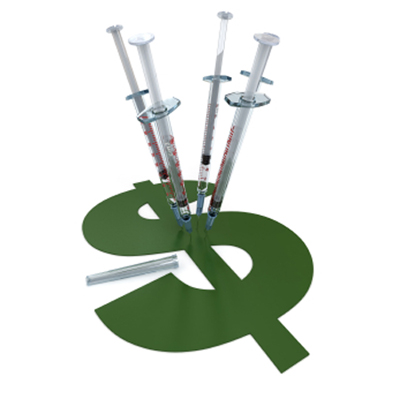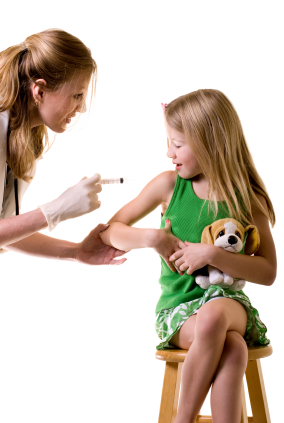Did you know that:
- There is no evidence that the HPV vaccine being given to your 12-year-old daughter will be effective
- The HPV vaccine may expose children to significant risk
- HPV vaccines are the first genetically modified (GM) vaccines and therefore present significant, unpredictable risks
- Unethical promotion of the vaccine, along with the use of misleading claims, are commonplace
- Are you in a position to make an informed choice to vaccinate or be vaccinated?
If the answer to any of the above is 'no', you owe it to yourself or your daughter to read on....
By Dr Damien Downing MBBS MIBiol
Medical Director, Alliance for Natural Health
President, British Society for Ecological Medicine
Media interference
It’s a great help to Pharma when a global news story gets going, such as the recent “swine-flu” one, that gets the public hoping for, and governments and manufacturers frantically making, a vaccine as the only solution (see elsewhere on this site). It’s also helpful when governments and the public accept without question the need for a vaccine such as the Human Papilloma Virus (HPV) one, which is of completely unknown effectiveness in its stated objective of preventing cervical cancer. This became news in the UK following the diagnosis and tragic death from cervical cancer of Jade Goody.
Global sales
Pharmaceutical companies global sales of vaccines were worth $24 billion in 2008, up 30% on the previous year, and greatly exceeding predictions from only 2 years ago. Lucky for the manufacturers, as sales of “old-fashioned” pharmaceuticals are generally approaching saturation. Vaccines are becoming the main hope for continued profits, along with monoclonal antibodies such as the new cancer drugs (“In 2007, total global monoclonal antibody sales reached $26 billion and are forecast to almost double by 2013.”)
"Hang on" you may say, "surely HPV vaccine (Gardasil, Cervarix) is known to be very succesful?" Only at causing the recipient to develop immunity to the virus - and only to the strains that are in the vaccine. We have no way of knowing what the effect of the vaccine will be on risk of developing cervical cancer, because it can take decades to appear, and the vaccines’ effect has only been followed for, at best, 6-7 years. According to an editorial in the NEJM last August "The bad news is that the overall effect of the vaccines on cervical cancer remains unknown". That isn’t going to change any time soon. And we have no way of knowing the long-term safety of the vaccine either.

Yet by the end of 2008 more than 23 million doses of Gardasil had been given in the USA; in the UK, a question in the House of Commons on 12th May elicited the response that almost a million doses of Cervarix had been given. How did this happen? By vigorous marketing, or what the manufacturers call 'education". In the USA this included adverts before the movie 'Sex and the City' using the "One Less Statistic" slogan, and paying doctors $4500 a time to lecture about Gardasil according to the New York Times. Elsewhere it involves payments to lobbyists, political organisations, women’s groups and of course doctors.
Pharmaceutical companies have got into trouble before for covertly supporting and funding ostensible patient groups and manufacturing spurious grassroots support, which has led to it becoming known as 'astroturfing' (spurious grass, right?). Cancer drugs are the obvious former example.
Not to mention websites, of course: Sanofi Pasteur set up TellHer.com websites in a number of European countries — although interestingly, the UK version was "under construction" when I looked (27/05/2009), and told me to "please contact a healthcare professional".
The problems with HPV vaccines
Does it work? Will it prevent cervical cancer and death from this? We don’t know.
We only know that the vaccine causes a strong immune response to the strains of the virus in the vaccine; this may or may not prevent the cancer developing, only time will tell. It is also very different from the normal immune response to the infection, which is much more muted. This may be a good or a bad thing. We know that this immune response is about two times stronger in girls of 10-15 years than in girls/women of 16-23, but what does that really mean?
Alarmingly, the Phase III studies also found in a sub-analysis that giving the vaccine to women who had evidence of previous HPV infection significantly increased their chances of developing pre-cancerous changes, termed CIN 2 or 3, over the 4 years of follow-up:
Group % Increase
PCR-positive and/or seropositive 33.7
PCR-positive and seropositive 44.6
(PCR-positive means that the virus has been found on a smear test and Seropositive means that antibodies against the virus have been found on a blood test)
This study looked at women of 16-23 years at the start, the majority of whom (73%) were negative for any sign of HPV infection. Overall the vaccine did reduce the risk of developing CIN changes (one of their main outcome measures), by somewhere between 23 and 43% depending how you analyse it—but this risk was pretty small anyway. In those positive for either sign of HPV infection at baseline, in whom the risk of developing CIN changes was several times greater, the vaccine appeared to increase it by around the same percentage. Result: a draw.
To be accurate, we have to point out that, as stated by Diane Harper, who was the lead scientist for the development of both vaccines, the 95% confidence intervals for these latter effects were very wide, and include the possibility that the vaccine did in fact improve risk in these groups. So we can only say that it probably increased the risk, and that it definitely didn’t improve it.

Does it work on young teenage girls?
We don’t know. All the efficacy studies were done on girls/women aged 16-23. It’s never been tested on younger girls. "The efficacy trials of this vaccine didn't include anyone under age 16"—also according to Diane Harper, one of the very few doctors or scientists who have been prepared to speak out.
How long will the immunity last?
We don’t know. Experience with other vaccines tells us that immunity often wanes after some years. This may happen here, and women may need booster injections to keep their immunity up. So far all we know from the published studies is that it continued to work for 5.5 years.
Might it cause other strains of the virus to increase in importance?
We don’t know. The strains included in the vaccine are the ones found in around 70% of women who develop cervical cancer, but there are at least 12 others. The published studies have so far found a non-significant upward trend in infection rates with these others. We don’t know where this will lead. By age 50, 80% of American women carry the infection, but only a tiny fraction of those will develop cervical cancer, so it’s not a very strong effect, even if infection is a necessary factor for developing the cancer. It’s even possible that getting infected with the common strains and developing immunity could protect you against worse more harmful infections. In fact, most women never know that they carry the virus, and many rid themselves of it naturally.
What effect will it have on our already efficient screening service?
We don’t know. Dr Angela Raffle, a well-published UK expert on cancer screening, said "The vaccine can only give immunity to some sub-types of HPV, therefore regular cervical screening will remain vital. If we do this [vaccination] quickly and badly, we could cause more deaths, from side effects, for example, or from giving girls false security that they are protected for life and no longer need to be screened."
What other risk factors are there for cervical cancer?
Several important ones. Remember that scientists consider that 99.7% cases of cervical cancer occur in the presence of HPV infection, but the lifetime risk of developing the cancer is estimated at 1 in 136 (0.73%) in the UK. If around half of women acquire the HPV infection by the time of diagnosis (which is mainly aged 30 to 45) then you can double this, meaning 1.5% of infected women will develop the cancer. So HPV infection is necessary, but hardly sufficient, for developing the cancer.
What are the other important risk factors?
According to Cancer Research UK:

The first two of those are hard to separate (the poorer you are the more likely to smoke heavily); the last two clearly flag up the importance of the immune system in this disease. It’s the one in the middle that raises problems; oral contraceptives. According to Dr Ellen Grant, who has long critiqued the science in homone studies, prolonged use of the pill most likely increases the risk by between 6 and 12 times, not the two stated.
Can the vaccine have serious adverse effects?
This we do know. There has been a high rate of reports of adverse effects from Gardasil in the USA. The Vaccine Adverse Event Reporting Service (VAERS) gives details of 33 deaths following vaccination, up to December 2008, and 6693 Emergency Room visits.
According to an analysis by the National Vaccine Information Center (NVIC), a US consumer organisation, comparing Gardasil to meningococcal vaccine there have been, per dose:
- 4 times more deaths
- 4 times more cardiac arrests
- 4 times more cases of Lupus (an auto-immune disease)
- 15 times more cases of stroke
- 33 times more thromboses
A separate Australian study found that, although still rare at 2.6 per 100,000 doses given, HPV vaccines caused 25 times more severe reactions than meningitis C vaccine. The NVIC says there is "compelling evidence for the need for action", including re-investigation by the FDA and CDC, and for doctors to fully inform patients and parents of the facts before vaccination.
In the UK more than 1300 girls have reportedly suffered severe reactions, including paralysis and convulsions. Some of the most worrying adverse effects are on pregnancy. In the studies, 5 women given HPV vaccine during pregnancy gave birth to children with birth defects, and 28 miscarried. The numbers aren’t enough for us to say whether there is a cause and effect there, which of course the manufacturers and the FDA strongly deny. The Cervarix data sheet says the data "are insufficient to recommend use of Cervarix during pregnancy".
Of course the main intended use is in 12-year old girls, before they become sexually active and so risk acquiring the virus— but if it only lasts 5 or 6 years they may lose their immunity just about the time they become sexually active. They could then end up being given a booster during or just before a pregnancy. And they may have acquired the virus by then, in which case the vaccine will, perhaps, increase their risk of developing pre-cancerous changes, not reduce it. If they also don’t tell their parents that they are on the pill, or the doctor doesn’t consider that a risk factor, they will be entering a vaccine-hormone interaction that is completely unknown and untested.

Why should this vaccine be more harmful than others?
Could it be because this is the first ever Genetically Modified (GM) virus? Previous virus vaccines have generally been 'attenuated' (i.e. weakened) versions of the wild virus, but both Gardasil and Cervarix use a completely new method of manufacture to produce a completely new form of vaccine containing what are known as VLPs—virus-like particles. These are proteins that occur on the outer coat of the virus, known as L1 proteins, which trigger an immune response. Two scientists at the NIH National Cancer Institute found that they could produce large quantities of VLPs in insect cells infected with recombinant baculovirus. So this vaccine is not only genetically engineered, it is also trans-species.
Scary stuff! We agree with Herb Newborg, a researcher and journalist, "The long term results of introducing into the human body genetically engineered, recombinant human, insect and animal DNA, along with human and animal strains of papillomavirus are unknown, untested and unproven, particularly when used as a vaccine, which effectively bypasses all of the body`s natural defenses against outside pathogens (skin, saliva, mucus, etc)."
Do we care?
There is now a small, unacknowledged, but forceful movement to challenge the dogma on vaccines. This group believes that with innovative technologies that we have today we can and should strive to avoid needless vaccinations. The International Coalition of Advocates for the People is based in the USA but already has UK members. They have challenged government and scientists to review the claims for the vaccine, submitting a document that flags up the doubts and the gaps in data. They make many of the above points, as well as questioning the use of the vaccine in children with medical histories. How can this vaccine be recommended for young girls with a history of serious illness if research has not been carried out in this important area? School nurses will not have access to medical records, or have the experience or knowledge to advise the parents of young girls on this serious issue. Are parents aware of this lack of research in order that they can discuss their children’s history of illness with their doctors?
Because of the efforts of this organization, continental Europeans are ahead of us here in the UK; in Germany a group of experts challenged the roll-out of the vaccine, saying:
"We did not find any results on the overall protection against pre-cancerous lesions – which would be a relevant endpoint (ie, a way of judging a link to cervical cancer] for individual girls as well as from a public-health perspective. Only in a recent study have selected data for Cervarix been presented. However, many relevant data are still missing, so no conclusions should be drawn until they are made available."
As a consequence, the Federal Joint Committee has called for a new review of the evidence. In Holland, only 49% of the target market accepted the vaccine.
The bottom line
As with all vaccinations, there is a human rights issue here. You should be able to make your own mind up about whether to vaccinate or be vaccinated, especially where children are concerned. But governments, including the UK, are very keen these days to impose vaccination on us whether we like it or not. Only this week in the UK there were calls for MMR vaccine to be made compulsory for children attending school.
Regarding safety, I never thought I’d use these words in the same sentence, but the most sensible comment on vaccines was made by Jim Carrey (his partner Jenny McCarthy has an autistic child and is very involved in the non-profit 'Generation Rescue'):
"In all likelihood the truth about vaccines is that they are both good and bad. While ingredients like aluminum, mercury, ether, formaldehyde and anti-freeze may help preserve and enhance vaccines, they can be toxic as well. The assortment of viruses delivered by multiple immunizations may also be a hazard. I agree with the growing number of voices within the medical and scientific community who believe that vaccines, like every other drug, have risks as well as benefits and that for the sake of profit, American children are being given too many, too soon. One thing is certain. We don't know enough to announce that all vaccines are safe!"
Back to ANH Vaccine Choice campaign
Back to ANH homepage








Comments
your voice counts
14 September 2011 at 12:31 am
I had the HPV shot before the age of twenty-six. Truly, I doubts about this for a long time. I just read a great deal about this and was scared on finding out that there are unwanted effects. We can just pray to God to protect us because medicine can save lives but it could also cripple us in some instances.
Your voice counts
We welcome your comments and are very interested in your point of view, but we ask that you keep them relevant to the article, that they be civil and without commercial links. All comments are moderated prior to being published. We reserve the right to edit or not publish comments that we consider abusive or offensive.
There is extra content here from a third party provider. You will be unable to see this content unless you agree to allow Content Cookies. Cookie Preferences